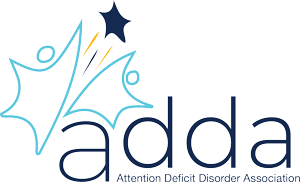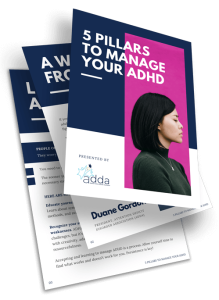
ADHD Support Groups: How Peer Support Helps Adults Thrive
Key Takeaways:
- ADHD support groups provide adults with a space to share their experiences, learn new coping strategies, and find accountability.
- You’ll find groups available in various formats, including online, in-person, and hybrid.
- You usually don’t need a formal diagnosis to join an ADHD support group.
- To get the most out of a group, it’s essential to be consistent and actively participate.
Living with ADHD as an adult can feel isolating.
Friends and loved ones may care deeply, but they don’t always understand what you’re experiencing. Building deeper connections becomes harder when you struggle to express yourself or stay fully present during conversations.
Over time, these social challenges may cause adult ADHDers to stop seeking support from those closest to them. But that kind of disconnection isn’t healthy in the long run.
The good news is that ADHD isn’t a journey you have to walk alone. ADHD support groups offer powerful connection and support. Their benefits aren’t just anecdotal. In fact, research has shown how useful peer support groups can be for adults with ADHD.
With the right group, you’ll have access to a safe and supportive environment. This is where you can build your support network and learn from people who have been in your shoes.
What Are ADHD Support Groups?
Support groups are a safe and non-judgmental space. They allow adults to connect, share their experiences, and exchange practical tips.
Support groups can be structured in different ways:
- In-person groups that often meet at local community centers, healthcare facilities, or universities
- Online ADHD support groups that can be accessed via forums, video calls, or chatting platforms
- Blended models combining face-to-face meetings with online resources or digital tools
Most adult ADHD peer support groups are open to all, whether or not they have a formal diagnosis.
Types of ADHD Support Groups
There are different types of ADHD support groups for adults to choose from. Each has a unique structure and focus.
These groups include:
- Structured groups: Psychologists, therapists, social workers, or ADHD coaches typically lead these groups. They provide professional guidance on managing symptoms. They may also include skill-building workshops to help members thrive in their daily lives.
- Peer-led groups: Individuals with ADHD typically run these informal spaces. These groups are a great place to share personal experiences and challenges. They also focus on exchanging support, encouragement, and advice.
- Online ADHD communities: Examples include private Facebook groups, Reddit communities, online forums, and virtual co-working platforms. These offer great flexibility and accessibility, which can be helpful if you don’t have local in-person options.
Since every group has its own style, it’s worth trying different formats and structures to see which is the best fit for you.

Why Peer Support Matters
Life with ADHD can be challenging. Not everyone will fully understand what you’re going through, and that can sometimes make the journey feel lonely.
This is where peer support can make a world of difference. Here’s how it helps:
- Reducing feelings of loneliness, fear, or anxiety
- Having your experiences, emotions, and struggles validated
- Receiving reassurance, encouragement, and support during tough times
- Learning practical advice and strategies that have worked for others with similar challenges
- Having accountability partners who can support you in building positive habits
Surrounding yourself with a community can help you form a positive self-image and a more hopeful outlook on life.
The Benefits of Peer Support for ADHD
Studies show that peer support can make a meaningful difference in the lives of adults with ADHD, highlighting several key benefits:
- Better symptom management: Support groups are a great place to seek practical advice. Members often share tips on improving focus, organization, and time management that have been tried and tested.[1]
- Improved emotional well-being: Having a supportive community can help reduce stress, anxiety, and depression. By sharing their experiences, adults with ADHD can feel more validated and understood. They can also learn healthier emotional coping strategies from others.[2,3]
- Greater workplace productivity and career outcomes: Support groups create opportunities to find mentors and accountability partners. Members can also gain advice on strengthening executive function skills, such as planning and prioritizing. This can boost productivity and performance.[4]
- Stronger social connections: Shared experiences within ADHD support groups help participants build meaningful friendships. Plus, members can practice their social skills in a supportive and non-judgmental environment.
What the Research Says
Let’s delve a little deeper into the research that shows the positive impact of peer support for adults with ADHD.
- 2022: A study in the Journal of Attention Disorders found that peer support can help protect adults with ADHD from developing depression and anxiety.[2]
- 2023: Participating in online ADHD communities increased awareness of ADHD symptoms and traits in young adults. It reduced self-blame and boosted self-esteem. These communities also gave participants practical coping tools for organization, emotional regulation, and time management.[1]
- 2024: A review reported that group-based education can improve core ADHD symptoms and overall mental health. It also enhanced planning, task performance, and time management, while cultivating a deeper understanding of ADHD.[5]
Together, these studies confirm that ADHD support groups and group-based interventions can be a powerful addition to your ADHD management plan.

Finding the Right ADHD Support Group
You may be able to find local support groups or providers where you live, but we created ADDA+ to fill this gap. We have live peer support groups gathering online every week, so it’s immediately available.
The best ADHD support groups are safe, inclusive, and non-judgmental. You should eventually feel comfortable enough to start opening up about your challenges.
What to Expect in a Peer Group
Every ADHD peer group is unique, but most share some common goals. These typically include building connections, reducing feelings of isolation, and providing practical strategies for managing ADHD symptoms.
Our ADHD peer support group meetings are structured around:
- Sharing personal stories and listening to others’ experiences
- Participating in guided discussions on a variety of ADHD-related topics
- Expert-led skill building
- Exchanging coping tools and strategies for focus, organization, and emotional regulation
- Body doubling, or working alongside someone else, to complete tasks
- Setting goals and keeping one another accountable
Set realistic expectations when joining a peer support group. These groups aren’t a substitute for medication, therapy, or professional treatment.
That said, they can still be a powerful addition to your overall management plan.
How to Make Peer Support Work for You
Simply joining an ADHD support group isn’t enough. The real value lies in consistently showing up and engaging with other members.
Here are some tips to get the most out of your experience:
- Commit to regular attendance by dedicating time and setting up reminders for meetings
- Participate actively and share your experiences openly and honestly
- Welcome accountability from fellow members to help you stay on track with your goals
- Listen with curiosity and be open to learning from others’ perspectives
- Ask questions and seek advice whenever you need guidance or support
Of course, if you’re not ready to commit to regular meetings yet, that’s okay. While consistency is beneficial, attending just a few sessions can still lead to meaningful progress.

Frequently-Asked Questions
What Are ADHD Support Groups?
ADHD support groups are safe, welcoming spaces where adults with diagnosed or suspected ADHD can come together to connect. In these groups, members share their experiences, challenges, and coping strategies.
How Do ADHD Support Groups Help Adults?
Support groups provide adults with ADHD a sense of belonging and connection, helping reduce feelings of isolation or loneliness. They also offer practical tools, advice, accountability, and motivation. By learning from others who are on a similar journey, members can discover new ways to manage symptoms and improve their overall quality of life.
Are Online ADHD Support Groups Effective?
Yes, online ADHD support groups can be just as effective as in-person ones. Virtual groups are more accessible and easier to fit into busy schedules. For many adults, this convenience makes it easier to maintain consistency and stay active.
What Happens During an ADHD Support Group Meeting?
A typical ADHD support group meeting involves members sharing personal experiences and discussing topics related to ADHD. They may also exchange tips and advice. Some groups may include activities like body doubling, goal-setting, or skill-building exercises.
ADHD Peer Support: Finding Strength in Numbers
Peer support is often overlooked in ADHD management. Yet, it’s one of the simplest and most powerful tools you can tap into.
If you’re unsure where to start, try joining just one session to see how it feels. Hearing someone share a similar experience or learning one new coping strategy might spark meaningful change.
And if you’re looking for a starting point, consider exploring ADDA+. It offers expert-led webinars, courses, and tools to help you manage ADHD. Plus, you’ll be learning alongside a supportive community of peers who can help keep you motivated and accountable.
References
[1] Ginapp, C. M., Greenberg, N. R., Macdonald-Gagnon, G., Angarita, G. A., Bold, K. W., & Potenza, M. N. (2023). The experiences of adults with ADHD in interpersonal relationships and online communities: A qualitative study. SSM. Qualitative research in health, 3, 100223. https://doi.org/10.1016/j.ssmqr.2023.100223
[2] Connolly, R. D., Lamont, A., & Speed, D. (2023). Perceived Social Support on the Relationship Between ADD/ADHD and Both Anxious and Depressive Symptoms Among Canadian Adults. Journal of attention disorders, 27(3), 283–293. https://doi.org/10.1177/10870547221136227
[3] Nordby, E. S., Schønning, V., Barnes, A., Denyer, H., Kuntsi, J., Lundervold, A. J., & Guribye, F. (2025). Experiences of change following a blended intervention for adults with ADHD and emotion dysregulation: a qualitative interview study. BMC psychiatry, 25(1), 56. https://doi.org/10.1186/s12888-025-06476-1
[4] Lauder, K., McDowall, A., & Tenenbaum, H. R. (2022). A systematic review of interventions to support adults with ADHD at work-Implications from the paucity of context-specific research for theory and practice. Frontiers in psychology, 13, 893469. https://doi.org/10.3389/fpsyg.2022.893469
[5] Skliarova, T., Pedersen, H., Holsbrekken, Å., Pedersen, S. A., Mandal, A., De Las Cuevas, C., Havnen, A., Gråwe, R., & Lara-Cabrera, M. L. (2024). Psychoeducational group interventions for adults diagnosed with attention-deficit/ hyperactivity disorder: a scoping review of feasibility, acceptability, and outcome measures. BMC psychiatry, 24(1), 463. https://doi.org/10.1186/s12888-024-05908-8





